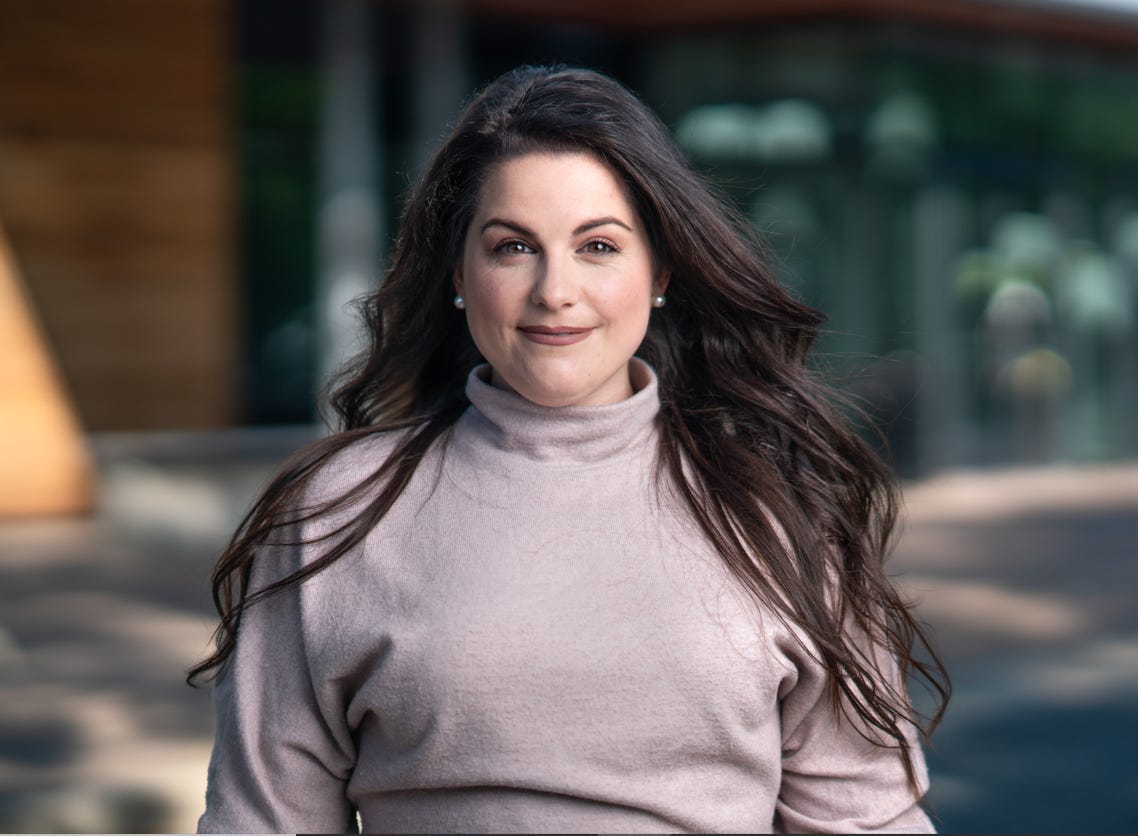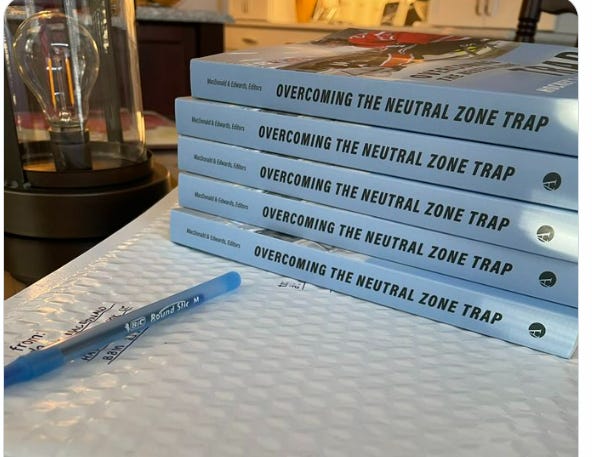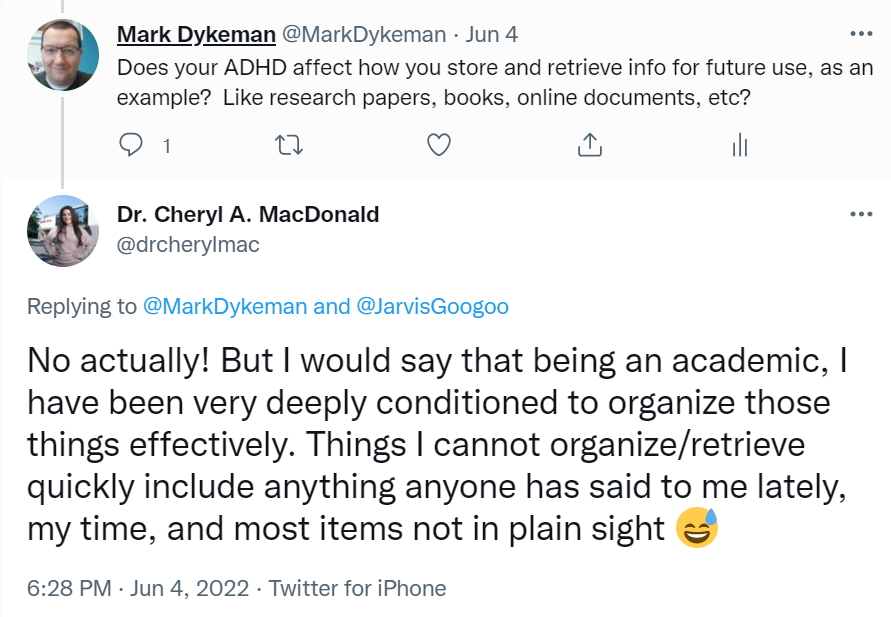Welcome to Atlantic Canada Mondays! Every 1 - 2 weeks we feature an interview with someone from one of the 4 Atlantic Canadian provinces. Our latest interview is with Dr. Cheryl MacDonald (aka @drcherylmac on Twitter) who is currently based in Nova Scotia. She is the Associate Director of the Saint Mary’s University Centre for the Study of Sport and Health in Halifax, NS. She is also one of the editors of Overcoming the Neutral Zone Trap: Hockey’s Agents of Change.
Now, over to Cheryl!
Your work seems to live at the intersections of sociology, psychology and sports. How did you come to enter this field of study?
I first became interested in masculinity studies and ice hockey during my undergraduate degree because my romantic partner, a men’s ice hockey player, experienced the sport much differently than I had in women’s hockey. Specifically, I was interested in the kinds of hazing, violence, and heterosexism that seemed specific to men’s hockey at the time and which were not at all in keeping with his personality outside of that context.
Eventually, as I began to better understand my own mental health and as I became closer to university athletes at my research centre (and as I became tired of social progress being slow in men’s hockey), my interests shifted towards university athlete support and development programming. I want to help provide them with the holistic education tools that will serve their overall wellbeing during their time at university.
According to your Twitter bio you have a PhD and you've listed some of the schools you've attended or been affiliated with. Was post-secondary education through the doctorate level always one of your goals?
No! I first wanted to be a pharmacist, which at the time, would have required me to complete at least two years of a science degree and then a pharmacy degree. Upon realizing that I was miserable in a science degree, I noticed that I was quite good at sociology. At the time, I believed (perhaps incorrectly) that to be successful with a sociology degree, one would also need a Master’s and PhD, so I made that my goal. So it wasn’t until I was approximately 20 years old that I decided I would be pursuing graduate studies.
On the whole, what impact has your gender had on your professional career? Do you see those environments becoming healthier and more rewarding places for women to work over time?
Particularly within men’s ice hockey studies, my gender almost always impacted my career. Sometimes my ability to be welcomed into spaces or to collect information relied heavily on me acting very feminine, very flirty, and accepting of sexist humour. I don’t think that space has necessarily improved a whole lot in terms of sexism; I’ve seen more progress where homophobia and racism are concerned.
Even in the context of my research, I’ve had participants tell me that the way elite men’s ice hockey players treat women and talk about them in their absence can be awful. Comparatively, I often feel more respected, valued, and understood in a university setting, whether academically or within our athletics department.
I'm also surmising that you're part of the Millennial generation. Do you find that you bring a much different perspective to your work compared to peers who are Gen X or Boomer generations?
I’m not sure that Gen X academics bring a much different perspective than I do. While I might be more familiar with contemporary approaches to gender and mental health, I often find myself looking to that group for guidance and expertise.
Relating to the Boomer generation can be more of a challenge because they grew up in a different enough environment that both their conditioning and expertise can create a generational gap between us. I think each generation does the best they can with the tools they’re given, but sometimes a select few folks become icons who make a lasting impact on those that come after them.
We've previously chatted briefly about your ADD diagnosis and how it affects your life. It seems that it has a greater effect on some of your day to day experiences than your scholarly/professional work. From a day to day perspective, what kind of coping mechanisms do you have to manage any attention or focusing challenges?
I think that, aside from medication, one of the best thing someone with ADHD can do is learn coping strategies. Where my family prioritized my education and I have been a relatively good student my whole life, I think that the tools for success as an academic were engrained in me from an early age, so the ADHD didn’t always present itself. In fact, there was a time in history when medical professionals believed that young girls who did well in school couldn’t possibly have ADHD.
Nonetheless, it’s truly in my everyday life that I continue to struggle with coping strategies because I have a short memory, I procrastinate, and I have difficulty multi-tasking. This mostly affects my relationships with other people, so I do my best to explain that I have ADHD, I set alarms on my phone to remind me of my commitments to others, I warn folks that they may need to remind me 2-3 times to do something, and I try hard not to multi-task around other people because I’m basically incapable of something like checking a text message while having an in-person conversation.
I asked you a follow up question on Twitter about ADHD and you had replied that as an academic you had been deeply conditioned to organize information, notes and records effectively. Can you elaborate on this?:
I answered a bit of this above, so I will add a bit more:
My hyperfixations (where I get lost for 6-8 hours on something) tend to only exist in relation to my hobbies such as knitting, painting, and baking. The only thing I struggle with in a major way in my work is long writing tasks like books or journal articles (I procrastinate, underestimate how much time I need to complete them, and I need a 2-4 hour block to zone in properly and focus).
I try to manage this by scheduling writing sessions with friends to help keep me accountable time-wise and also get some socialization in during breaks. Otherwise, my office and computer desktop are more tidy than my bedroom, I will pump out a blog post way faster than I do my chores at home, and I am more present in meetings with my colleagues than I am with friends and family. I think this has to do with prioritizing education from an early age, as mentioned above (for example, the penalty for misbehaving or not doing well in school from my parents was worse than any other punishments).
When I read your bio it looks like you have a presence in both NB and NS. Do you prefer one over the other? Would you recommend one, the other or both as good places to live?
I love New Brunswick and Nova Scotia equally. My family is in NB and the job I love is in NS. I love the bilingualism in NB and the shorelines in NS. I like the quick access to other cities in NB and the plethora of Irish pubs in NS. I wish there was better access to family physicians and mental health care in both! I recommend them equally as good places to live, but this probably depends on individual wants and needs, of course.
Pretend you wake up one morning and the Internet has been destroyed. What's the first thing you do?
I would make sure I still had access to my music because I’m not sure that it would still be available offline and that’s a terrifying thought!
Then I would call my Mom to make sure it’s not just me experiencing the destroying of the internet. After that, I would have an anxiety attack over the loss of email and Netflix. Then I would probably eat comfort food.
Thanks to much to Cheryl for participating in this interview! You can find the links to previous Atlantic Canada Mondays interviews here.









Knew it! A great interview with a very cool person!
Great job, Mark! Also need to go add her now because of this interview, she seems so cool!!